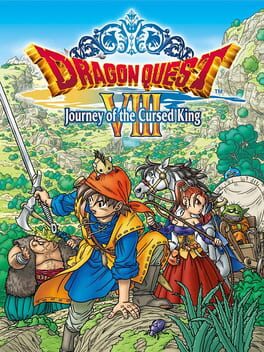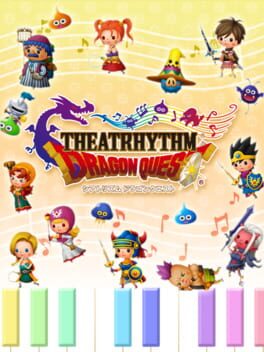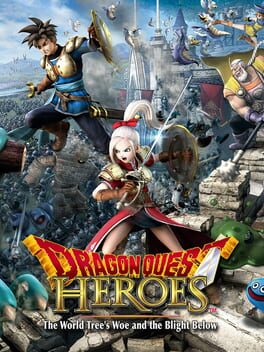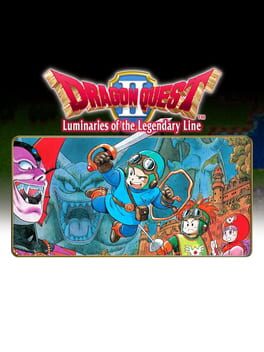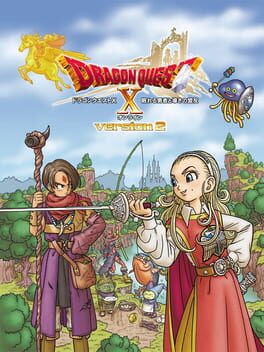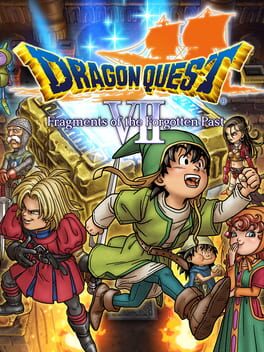

Experience one of the most critically acclaimed Dragon Quest game in full 3D!
Also in series
Reviews View More
I grew up playing Dragon Quest games (or Dragon Warrior as we knew it here in the states) on the NES, which for me and many others, was an introduction to the console world of RPGs. At the time, I had a vague understanding of dungeons and dragons, had seen fantasy movies, and had read the Hobbit, so this type of world, at this point, was already very appealing to me. But after the NES days, I never experienced the later iterations of Dragon Quest, as they somehow fell off my radar.
Fast forward to 2016, and we now have a collection of these games available on the iPhone. Many balk at the mobile price tag for this game, accustomed to 99 cent titles and modern, freemium games. What they don't realize is that this is a deep experience, packed with content that you don't get with most modern, cheap games (and unlike many modern mobile games, there isn't any in-game purchases).
I recently completed the game, and am listing out what I feel are the "good" and the "bad" of DQVIII. Of course, I am omitting critiques one would make with modern games, this being about 12 years old. However, I am including criticisms about the platform of which I experienced it on (the iPhone 6s). Lastly, be aware that there are light spoilers below, although nothing that would ruin the experience.
The Good
Epic - This is a truly epic RPG, with dozens of hours of gameplay, and a rich story that gets more complex as you progress further into your journey. If the price originally turned you away then I want to assure you that you have made a mistake.
Balanced Economy - I’ve played a number RPGs where you can too easily buy the weapons, armor, and items throughout the game. Whereas in DQVIII I found myself always short of being able to buy all of the latest gear at the newest town I passed through. This created the dynamic where I had to decide between some options: only buy a few items that appear to hold the best value and return later with more money, or sell old gear that might be usable in the alchemy pot later (a short return but not a solid investment). This type of moderate inventory and money management struggle is what makes RPGs interesting.
Travel progression - You start on foot and soon after learn to teleport to previous locations. From there, you earn a ship, which allows you to expand your search further. Next, as an optional mission, you earn a mount, allowing you to travel on ground at a faster rate. And at the point the mount is received, the distance in areas from point A to point B increases to accommodate the faster mount speed, giving the player the impression of grander exploration. Lastly, with the assistance of the mount, revising older areas is less daunting and time draining. In short, as the world continues to expand, and your explorations with it, your ability to explore in faster and more interesting ways expands with it.
Characters - The characters have unique personality traits and motivations, yet are banded together with a common goal. The group dynamic is often humorous and playful, balanced with the serious nature of the story.
Monster team - Like a light version of Pokemon, players can hunt for new monsters to defeat and recruit, create teams out of those monsters, and then use them in battles both out in the field and in the monster arena. The monster team is a great little side element that runs parallel to the main story throughout the game, by providing the player with yet another reason to explore the open environments.
Alchemy - Players combine items, weapons, and other gear together to form new items. Not only is it fun to find new recipes and discover ones through experimentation, but it also adds a layer of complexity in terms of how you upgrade your weapons and armors. In other words, instead of simply purchasing all of the best gear, I found myself saving older gear in the hopes of crafting it into something better, later on.
Skills - Skill points are gained as you level up, and can be spent to build up knowledge between various weapons, as well as some key abilities. You have to decide fairly early on which pathway you want to explore with your skill points, otherwise, you may find yourself diversifying your points too thinly, making it difficult to master something in particular. This system, like with alchemy, adds yet another layer of complexity, by encouraging the player to hold on to weapons that aren’t quite as powerful as their current, as that less powerful weapon may leapfrog over another as the associated weapon attributes are upgraded.
Animations - The animations are fun, clever, and have a fitting anime like style.
Retro audio - The original Dragon Quest was released in 1986, whereas Dragon Quest VIII was released in 2004). The decision to incorporate both modern sound effects (well, modern for the time it was released) with classic sound effects dating back to the original Dragon Quest was a nice touch.
The Bad
Crashes - All in all, by the time I completed this game it had crashed about 15 times. And considering this is on an iPhone 6s, which is a newer device than what this was originally launched on, that definitely feels too high of a count. Looking at the reviews I can tell that this is one of, if not the top reason for the negative reviews. Thankfully there is an autosave feature, which records your progress automatically, and quite frequently at that. Because of this feature I never had to replay much to get back to where I was. Surprisingly, the game handles the situation where I switch around to other apps and back rather smoothly, without crashing.
No outside music - The game doesn’t allow for the player to run music, podcasts, etc. while playing. And in today’s world, it’s fairly expected to be able to run audio in the background while playing a game on your phone. However, considering the amount of crashes experienced, I’m not surprised that the developers restricted this ability.
The music - Which brings me to the actual music in the game. While the music isn’t terrible, it isn’t particularly good either. And there isn’t much variety either.
Tactics - There are a diverse set of tactics that the player can select from, per character, for battle actions, such as “Fight Wisely”, which is the default. I struggled at first with placing tactics in the “bad” section of this review, because there is both good and bad here. Specially where I think the negatives come from with tactics is how overpowered it often felt. For example, when using “Fight Wisely”, my characters always avoided using abilities and spells that were not effective on an enemy, even if it was the first time I encountered that enemy. And when an enemy was susceptible to a particular type of attack, such as “sleep”, my characters would, like mind-readers, use that ability. Further, characters would always adapt their strategy mid-turn, something you are incapable of doing in any turn-based RPG such as these, without this type of exploit at your fingertips. For example, all of my players have full health. I elect that all of my characters “Fight Wisely”, and the enemy hits one of them severely, doing heavy damage. Then, one of the characters uses full heal on that wounded player. As you can see in this scenario, this is a switch in strategy, something I could not have done had I been executing actions in the traditional way, that makes the tactic too superior to regular decision based combat.
Free Maps - 98% of the world is detailed on a map from the very beginning. There is no purchasing of maps. There is no fog-of-war. That means that you will discover a hidden cave or ruins, long forgotten through time, something that the town’s people think of as myth…but don’t worry, because you have a full, detailed map of every room. Exploration is one of the most engaging elements of an RPG, and providing maps for unexplored areas means that a lot of the exploration elements are lost.
Gambling - Sure, it’s optional. But when you are someone like me who wants to earn the rare items of an RPG, you start to feel compelled to participate.
Final Boss - The battle was too simple, and straightforward.
Fast forward to 2016, and we now have a collection of these games available on the iPhone. Many balk at the mobile price tag for this game, accustomed to 99 cent titles and modern, freemium games. What they don't realize is that this is a deep experience, packed with content that you don't get with most modern, cheap games (and unlike many modern mobile games, there isn't any in-game purchases).
I recently completed the game, and am listing out what I feel are the "good" and the "bad" of DQVIII. Of course, I am omitting critiques one would make with modern games, this being about 12 years old. However, I am including criticisms about the platform of which I experienced it on (the iPhone 6s). Lastly, be aware that there are light spoilers below, although nothing that would ruin the experience.
The Good
Epic - This is a truly epic RPG, with dozens of hours of gameplay, and a rich story that gets more complex as you progress further into your journey. If the price originally turned you away then I want to assure you that you have made a mistake.
Balanced Economy - I’ve played a number RPGs where you can too easily buy the weapons, armor, and items throughout the game. Whereas in DQVIII I found myself always short of being able to buy all of the latest gear at the newest town I passed through. This created the dynamic where I had to decide between some options: only buy a few items that appear to hold the best value and return later with more money, or sell old gear that might be usable in the alchemy pot later (a short return but not a solid investment). This type of moderate inventory and money management struggle is what makes RPGs interesting.
Travel progression - You start on foot and soon after learn to teleport to previous locations. From there, you earn a ship, which allows you to expand your search further. Next, as an optional mission, you earn a mount, allowing you to travel on ground at a faster rate. And at the point the mount is received, the distance in areas from point A to point B increases to accommodate the faster mount speed, giving the player the impression of grander exploration. Lastly, with the assistance of the mount, revising older areas is less daunting and time draining. In short, as the world continues to expand, and your explorations with it, your ability to explore in faster and more interesting ways expands with it.
Characters - The characters have unique personality traits and motivations, yet are banded together with a common goal. The group dynamic is often humorous and playful, balanced with the serious nature of the story.
Monster team - Like a light version of Pokemon, players can hunt for new monsters to defeat and recruit, create teams out of those monsters, and then use them in battles both out in the field and in the monster arena. The monster team is a great little side element that runs parallel to the main story throughout the game, by providing the player with yet another reason to explore the open environments.
Alchemy - Players combine items, weapons, and other gear together to form new items. Not only is it fun to find new recipes and discover ones through experimentation, but it also adds a layer of complexity in terms of how you upgrade your weapons and armors. In other words, instead of simply purchasing all of the best gear, I found myself saving older gear in the hopes of crafting it into something better, later on.
Skills - Skill points are gained as you level up, and can be spent to build up knowledge between various weapons, as well as some key abilities. You have to decide fairly early on which pathway you want to explore with your skill points, otherwise, you may find yourself diversifying your points too thinly, making it difficult to master something in particular. This system, like with alchemy, adds yet another layer of complexity, by encouraging the player to hold on to weapons that aren’t quite as powerful as their current, as that less powerful weapon may leapfrog over another as the associated weapon attributes are upgraded.
Animations - The animations are fun, clever, and have a fitting anime like style.
Retro audio - The original Dragon Quest was released in 1986, whereas Dragon Quest VIII was released in 2004). The decision to incorporate both modern sound effects (well, modern for the time it was released) with classic sound effects dating back to the original Dragon Quest was a nice touch.
The Bad
Crashes - All in all, by the time I completed this game it had crashed about 15 times. And considering this is on an iPhone 6s, which is a newer device than what this was originally launched on, that definitely feels too high of a count. Looking at the reviews I can tell that this is one of, if not the top reason for the negative reviews. Thankfully there is an autosave feature, which records your progress automatically, and quite frequently at that. Because of this feature I never had to replay much to get back to where I was. Surprisingly, the game handles the situation where I switch around to other apps and back rather smoothly, without crashing.
No outside music - The game doesn’t allow for the player to run music, podcasts, etc. while playing. And in today’s world, it’s fairly expected to be able to run audio in the background while playing a game on your phone. However, considering the amount of crashes experienced, I’m not surprised that the developers restricted this ability.
The music - Which brings me to the actual music in the game. While the music isn’t terrible, it isn’t particularly good either. And there isn’t much variety either.
Tactics - There are a diverse set of tactics that the player can select from, per character, for battle actions, such as “Fight Wisely”, which is the default. I struggled at first with placing tactics in the “bad” section of this review, because there is both good and bad here. Specially where I think the negatives come from with tactics is how overpowered it often felt. For example, when using “Fight Wisely”, my characters always avoided using abilities and spells that were not effective on an enemy, even if it was the first time I encountered that enemy. And when an enemy was susceptible to a particular type of attack, such as “sleep”, my characters would, like mind-readers, use that ability. Further, characters would always adapt their strategy mid-turn, something you are incapable of doing in any turn-based RPG such as these, without this type of exploit at your fingertips. For example, all of my players have full health. I elect that all of my characters “Fight Wisely”, and the enemy hits one of them severely, doing heavy damage. Then, one of the characters uses full heal on that wounded player. As you can see in this scenario, this is a switch in strategy, something I could not have done had I been executing actions in the traditional way, that makes the tactic too superior to regular decision based combat.
Free Maps - 98% of the world is detailed on a map from the very beginning. There is no purchasing of maps. There is no fog-of-war. That means that you will discover a hidden cave or ruins, long forgotten through time, something that the town’s people think of as myth…but don’t worry, because you have a full, detailed map of every room. Exploration is one of the most engaging elements of an RPG, and providing maps for unexplored areas means that a lot of the exploration elements are lost.
Gambling - Sure, it’s optional. But when you are someone like me who wants to earn the rare items of an RPG, you start to feel compelled to participate.
Final Boss - The battle was too simple, and straightforward.
Dragon quest serisine hiç ilgim yoktu konsept olarak çok düz basit ve aşırı Japonsu geliyordu. Japonsu yu açmak gerekirse oyun olarak Japonlar ın belli noktaları vardır. Mesela bu adamlar yıllarca grind yapabilir salak saçma yerlere çok önemli itemler veya hikâyeler koyabilir buna da bana hitap etmeyen bir consept eklenince direk kaçarak uzaklaşmıştım. En sonunda ise dq ya bir şans vermeye karar verdim zaten telefon sürümünü oynayacaktım. Dışarıda ve dungeon da quick save varken şehrin içinde sadece kiliseden save atabiliyorsunuz. Bu oyun için önemli bir nokta çünkü sadece kiliseden save yapmak aşırı zahmetli. Dragon quest 8 consept olarak bana hitap etmese de bana kendi macerama çıkıyor hissi verdiriyordu. Bu his ile bir noktaya kadar oynadım hikâye de beni devam etmem için o kadar motive etmesede devam ettim. Bosstan tek yedim ve grind yapmam gerektiğini anladım ardından 20 dk boyunca kasılıp hiç level atlayamadım ve oyunu bıraktım. Oyunun grindi yok grinden oyunu var belki bir gün geri dönerim ama zor baya.
